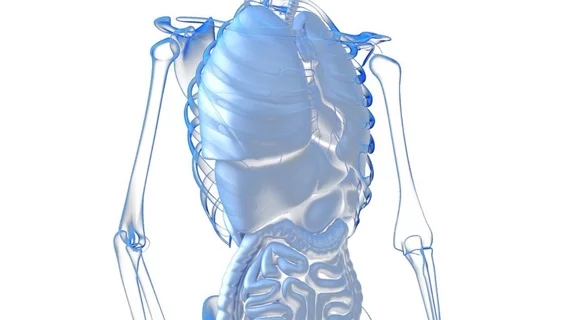CT reveals perceived stomachache as potential COVID symptom
Radiologists who come upon certain unanticipated findings in the lower lungs while reading abdominopelvic CTs for gastrointestinal symptoms should alert the referring physician to possible COVID-19 infection.
That is according to researchers at New York University whose work is running online in the American Journal of Roentgenology.[1]
Lead author Bari Dane, MD, and colleagues retrospectively reviewed records of select patients who were imaged with CT at their institution over a 10-day period in March. The patients, 23 in number, did not present with typical COVID symptoms. Most of them, 19, had abdominal pain as the reason for their scan.
What the 23 had in common were unexpected lung-base findings—mainly ground-glass opacities—along with the words “COVID” (or “pneumonia/pneumonitis”) and “atypical” entered into the radiology report by the interpreting physicians.
Eleven of the 23 patients had no extrapulmonary findings. And 17 of 17 who underwent polymerase chain reaction (PCR) testing came back positive for COVID-19.
“To our knowledge, lung-base findings on initial abdominopelvic CT that are concerning for COVID-19 have not yet been reported for patients with no previous clinical suspicion for COVID-19,” the authors comment in their discussion section.
The study’s predominant finding of ground-glass opacities absent respiratory symptoms is consistent with lung findings in asymptomatic COVID patients as reported in other recent studies, they point out.
Dane and colleagues further note that the abdominal pain with which most of the COVID-positive patients presented may have been referred from the pleura or diaphragm.
Such pain may prompt clinicians to order abdominopelvic CT without specifically considering COVID-19 “even when imaging is performed in an emergency setting in a region affected during the current global pandemic,” they add. “Ground-glass opacities at the lung bases, which usually are multilobar, peripheral or peribronchovascular in distribution, are often the only pertinent finding observed on these abdominopelvic CT examinations.”
Radiologists identifying such findings, they conclude, “should immediately alert the referring clinician of this concern for COVID-19.”
The journal has posted the study in full for free.

